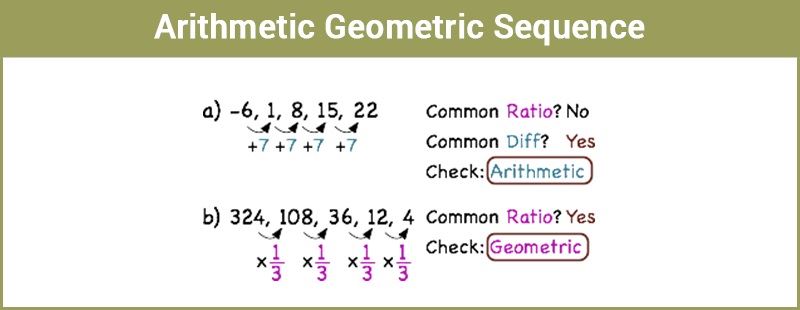Easy Explanation of Arithmetic and Geometric Sequences

Arithmetic Geometric sequence is the fusion of an arithmetic sequence and a geometric sequence. In this article, we are going to discuss the arithmetic-geometric sequences and the relationship between them. Also, get the brief notes on the geometric mean and arithmetic mean with more examples.
What is Arithmetic Sequence?
An arithmetic sequence is of the form:
\(\begin{array}{l}a, ~a+d,~ a+2d,~……~a~+~(n~-~2)d,~ a~+~(n~-~1)d\end{array} \)
where
\(\begin{array}{l}a\end{array} \)
is the first term,\(\begin{array}{l}d\end{array} \)
is the common difference \(\begin{array}{l}a~+~(n~-~1)d\end{array} \) \(\begin{array}{l}n^{th}\end{array} \)
What is a Geometric Sequence?
Similarly, a geometric sequence is of the form \(\begin{array}{l}b,~ br, ~br^2~,~ ……~br^{n~-~2}, br^{n~-~1}\end{array} \)
here
\(\begin{array}{l}b\end{array} \)
is the first term,\(\begin{array}{l}r\end{array} \)
is the common ratio \(\begin{array}{l}br^{n~-~1}\end{array} \) \(\begin{array}{l}n^{th}\end{array} \)
What is Arithmetic Geometric Sequence?
Let \(\begin{array}{l}a_1,~ a_2, ~a_3,~ …….~a_n\end{array} \) \(\begin{array}{l}b_1,~ b_2,~ b_3,~ …….~b_n\end{array} \)
Then, \(\begin{array}{l}a_1 ~b_1,~ a_2~ b_2,~ a_3~ b_3,~ ……, ~a_n~ b_n\end{array} \)
\(\begin{array}{l}ab,~ (a~+~d)br, ~(a~+~2d)br^2,~ …….,~[a~+~(n-2)d]~br^{n~-~2}, ~[a~+~(n~-~1)d]br^{n~-~1}\end{array} \)
Sum of n terms of the above sequence is found as follows:
\(\begin{array}{l}S_n =ab+ (a+d)br +(a+2d)br^2+…….+ [a+(n-2)d]br^{n-2}+ [a+(n-1)d]br^{n-1}\end{array} \)
Now, multiplying each term with
\(\begin{array}{l}r\end{array} \)
gives, \(\begin{array}{l}rS_n = abr+(a+d)br^2+ (a+2d)br^3+….+[a+(n-2)d]br^{n-1}+[a+(n-1)d]br^n\end{array} \)
Subtract equation (2) from equation (1), we get
\(\begin{array}{l}S_n~-~rS_n = ab~+~dbr~+~dbr^2~+~dbr^3~+~ ……~+ ~dbr^{n-1}~–~[a~+~(n~-~1)d]br^n\end{array} \)
In the above series, if we exclude the first term and the last term,
\(\begin{array}{l}dbr~+~dbr^2~+~ dbr^3~ +~ ……….~+ ~dbr^{n~-~1}\end{array} \)
Sum of \(\begin{array}{l}n\end{array} \) \(\begin{array}{l}\frac{1~-~r^n}{1~-~r}\end{array} \)
Therefore, \(\begin{array}{l}dbr~+~dbr^2~+~ dbr^3~ +~ ……….~+ ~dbr^{n~-~1}\end{array} \) \(\begin{array}{l}dbr\frac{1~-~r^{n~-~1}}{1~-~r}\end{array} \)
Now, (3) becomes as,
(1-r) Sn = \(\begin{array}{l}ab ~+~ dbr\frac{1~-~r^{n~-~1}}{1~-~r}~-~[a~+~(n~-~1)d]br^n\end{array} \)
where
\(\begin{array}{l}r~≠~0\end{array} \)
Sn = \(\begin{array}{l}\frac{ab}{1~-~r}~+~dbr\frac{1~-~r^{n~-~1}}{(1-r)^2}~ -~\frac{[a~+~(n-1)d]br^n}{1~-~r}\end{array} \)
If the common ratio of the sequence lies between -1 and 1, then
\(\begin{array}{l} \lim\limits_{n→∞}~r^n\end{array} \) \(\begin{array}{l}0\end{array} \)
Therefore, the sum of infinite terms of the sequence in (1) is,
S = \(\begin{array}{l}\frac{ab}{1~-~r} ~+ ~\frac{dbr}{(1-r)^2}\end{array} \)
Geometric Mean
Consider two positive numbers a and b, the geometric mean of these two numbers is
\(\begin{array}{l}√ab\end{array} \)
.For example; Geometric mean of 3 and 27 is √(3×27)=9
The numbers 3, 9, 27 is in a G.P with common ratio 3.
In general; between 2 positive numbers a and b, we can insert as many numbers as we like such that the resulting sequence forms a G.P.
Let G1, G2, G3……Gn be the n numbers inserted between the positive numbers a and b such that,
a,G1,G2,G3……Gn forms a G.P. "a" is the first term and b is (n+2)th term.
b = ar{n+1},
\(\begin{array}{l} r = \left(\frac{b}{a}\right)^{\frac{1}{n~+~1}}\end{array} \)
It gives, G1 = ar = \(\begin{array}{l}a\left(\frac{b}{a}\right)^{\frac{1}{n~+~1}}\end{array} \)
G2 = ar2 = \(\begin{array}{l}a\left(\frac{b}{a}\right)^{\frac{2}{n~+~1}}\end{array} \)
G2 = ar3 = \(\begin{array}{l}a(\frac{b}{a})^{\frac{3}{n~+~1}}\end{array} \)
Gn = arn = \(\begin{array}{l}a(\frac{b}{a})^{\frac{n}{n~+~1}}\end{array} \)
Relation Between Arithmetic Mean (A.M) and Geometric Mean (G.M)
Consider two positive numbers \(\begin{array}{l}a\end{array} \) \(\begin{array}{l}b\end{array} \)
\(\begin{array}{l}A.M\end{array} \) \(\begin{array}{l}\frac{a~+~b}{2}\end{array} \)
\(\begin{array}{l}G.M\end{array} \) \(\begin{array}{l}√ab\end{array} \)
\(\begin{array}{l}A.M~-~G.M\end{array} \) \(\begin{array}{l}\frac{a~+~b}{2}~-~√ab\end{array} \) \(\begin{array}{l}\frac{a~+~b~-~2√ab}{2}\end{array} \)
\(\begin{array}{l}A.M~-~G.M\end{array} \) \(\begin{array}{l}\frac{(√a~-~√b)^2}{2}\end{array} \)
Therefore,
\(\begin{array}{l}A.M~≥~G.M\end{array} \)
Arithmetic Geometric Sequence Example
Example 1:
Insert 3 numbers between 4 and 64 so that the resulting sequence forms a G.P.
Solution:
Let G1,G2,G3 be the three numbers to be inserted between 4 and 64,
\(\begin{array}{l} r = (\frac{b}{a})^{\frac{1}{n~+~1}} = (\frac{64}{4})^{\frac{1}{3~+~1}} = (16)^{\frac{1}{4}} = 2\end{array} \)
G1 =
\(\begin{array}{l}4~×~2\end{array} \)
= 8G2 =
\(\begin{array}{l}8~×~2\end{array} \)
= 16G3 =
\(\begin{array}{l}16~×~2\end{array} \)
= 32Example 2:
A.M and G.M of two numbers are 5 and 4 respectively. Find the two numbers.
Solution:
Let the numbers be \(\begin{array}{l}a\end{array} \) \(\begin{array}{l}b\end{array} \)
\(\begin{array}{l}\frac{a~+~b}{2}\end{array} \) \(\begin{array}{l}5\end{array} \) \(\begin{array}{l}a~+~b\end{array} \) \(\begin{array}{l}5~×~2\end{array} \) \(\begin{array}{l}10\end{array} \)
\(\begin{array}{l}√ab\end{array} \) \(\begin{array}{l}4\end{array} \) \(\begin{array}{l}ab\end{array} \) \(\begin{array}{l}16\end{array} \)
\(\begin{array}{l}(a~+~b)^2~-~(a~-~b)^2\end{array} \) \(\begin{array}{l}4ab\end{array} \)
\(\begin{array}{l}{10}^2~-~(a~-~b)^2\end{array} \) \(\begin{array}{l}4~×~16\end{array} \) \(\begin{array}{l}64\end{array} \)
\(\begin{array}{l}(a~-~b)^2\end{array} \) \(\begin{array}{l}100~-~64\end{array} \) \(\begin{array}{l}36\end{array} \)
\(\begin{array}{l}a~-~b\end{array} \) \(\begin{array}{l}±6\end{array} \)
By solving (1) and (2),
\(\begin{array}{l}2a\end{array} \) \(\begin{array}{l}16\end{array} \) \(\begin{array}{l}a\end{array} \) \(\begin{array}{l}\frac{16}{2}\end{array} \) \(\begin{array}{l}8\end{array} \)
\(\begin{array}{l}b\end{array} \) \(\begin{array}{l}10~-~a\end{array} \) \(\begin{array}{l}10~-~8\end{array} \) \(\begin{array}{l}2\end{array} \)
Thus, some examples of the arithmetic geometric progression are discussed above. To learn different kinds of progressions in Maths, download BYJU'S – The Learning App.
wadsworthladest78.blogspot.com
Source: https://byjus.com/maths/arithmetic-geometric-sequence/
0 Response to "Easy Explanation of Arithmetic and Geometric Sequences"
Post a Comment